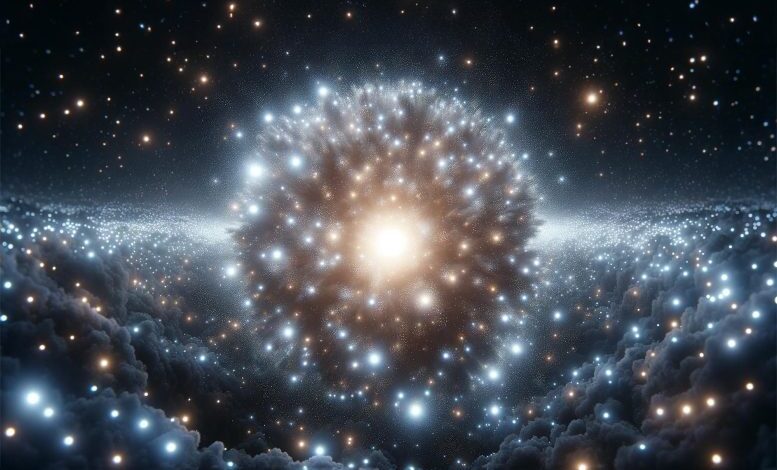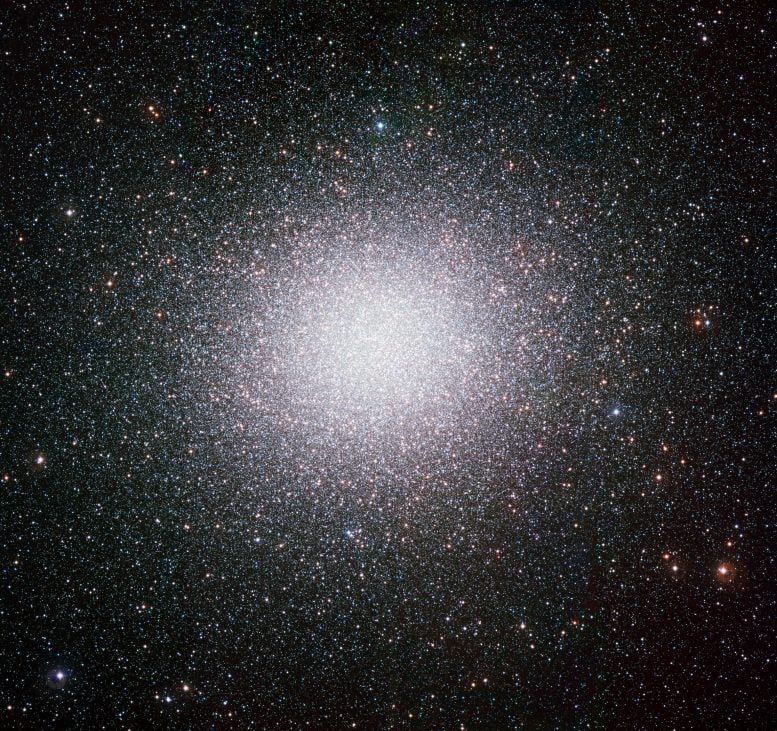The Creation of Intermediate-Mass Black Holes in Dense Star Clusters


A groundbreaking study provides fresh insights into the origins of intermediate-mass black holes (IMBHs). By conducting the first-ever simulations of individual stars in a forming globular cluster, researchers have identified potential mechanisms through which these dense star clusters could give rise to IMBHs. Credit: SciTechDaily.com
New research utilizes the first-ever simulations of individual stars in forming globular clusters to explore potential formation mechanisms of intermediate-mass black holes.
A new study demonstrated a possible formation mechanism of intermediate-mass black holes in globular clusters, star clusters that could contain tens of thousands or even millions of tightly packed stars. The first ever star-by-star massive cluster-formation simulations revealed that sufficiently dense molecular clouds, the “birthing nests” of star clusters, can give birth to very massive stars that evolve into intermediate-mass black holes. The joint research was led by Michiko Fujii of the University of Tokyo and the findings were published today (May 30) in the journal Science.
Theoretical Evidence for IMBHs
“Previous observations have suggested that some massive star clusters (globular clusters) host an intermediate-mass black hole (IMBH),” Fujii explains the motivation for the research project. “An IMBH is a black hole with a mass of 100-10,000 solar masses. So far, there has been no strong theoretical evidence to show the existence of IMBH with 1,000-10,000 solar masses compared to less massive (stellar mass) and more massive (supermassive) ones.”

Star cluster forming in a giant molecular cloud reproduced by the simulation. This image is based on the simulation. Blue dots represent individual stars. Dark and bright color indicate the gas temperatures (cold and hot). Visualized by Takaaki Takeda (VASA Entertainment Inc.) Credit: Michiko Fujii and Takaaki Takeda. 2024
Simulation Challenges and Insights
Birthing nests might conjure up images of warmth and tranquility. Not so with stars. Globular star clusters form in turmoil. The differences in density first cause stars to collide and merge. As the stars continue to merge and grow, the gravitational forces grow with them. The repeated stellar collisions in the dense, central region of globular clusters are called runaway collisions. They can lead to the birth of very massive stars with more than 1,000 solar masses. These stars could potentially evolve into IMBHs.
However, previous simulations of already-formed clusters suggested that stellar winds blow away most of their mass, leaving them too small. To investigate whether IMBHs could “survive,” researchers needed to simulate a cluster while it was still forming.
“Star cluster formation simulations were challenging because of the simulation cost,” Fujii says. “We, for the first time, successfully performed numerical simulations of globular cluster formation, modeling individual stars. By resolving individual stars with a realistic mass for each, we could reconstruct the collisions of stars in a tightly packed environment. For these simulations, we have developed a novel simulation code, in which we could integrate millions of stars with high accuracy.”

Omega Centauri, a globular cluster in the Milky Way galaxy. This globular cluster may host an intermediate-mass black hole. Credit: ESO
Future Research Directions
In the simulation, the runaway collisions indeed led to the formation of very massive stars that evolved into intermediate-mass black holes. The researchers also found that the mass ratio between the cluster and the IMBH matched that of the observations that originally motivated the project.
“Our final goal is to simulate entire galaxies by resolving individual stars,” Fujii points to future research. “It is still difficult to simulate Milky Way-size galaxies by resolving individual stars using currently available supercomputers. However, it would be possible to simulate smaller galaxies such as dwarf galaxies. We also want to target the first clusters, star clusters formed in the early universe. First clusters are also places where IMBHs can be born.”
Reference: “Simulations predict intermediate-mass black hole formation in globular clusters” 30 May 2024, Science.


